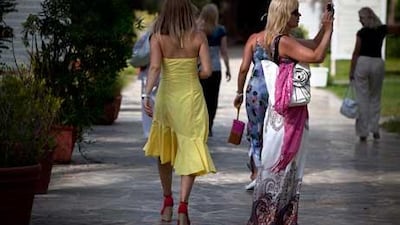Abu Dhabi Tourism Police have released a booklet that details some popular dos-and-don'ts for tourists visiting the emirate.
Brig Gen Omair Al Mihiri, deputy director general of police operations, said the pamphlets were designed to increase the sense of security among tourists and to keep them from being penalised unnecessarily.
"The pamphlet was prepared to educate tourists on rules of public behaviour," he said. "It includes trends and behaviour which is uncivilised and would make them subject to prosecution."
Brig Gen Al Mihiri said police were ready to help any tourist and communicate with them in their mother tongue if necessary. He said the pamphlets would be available at Abu Dhabi International Airport and at hotels.
The pamphlet notes that possession or abuse of drugs, drinking alcohol in unlicensed places, drink driving, prostitution, begging and vagrancy are all illegal activities, and against "local values and traditions".
During the month of Ramadan, tourists are asked to refrain from eating, drinking or smoking in public places during daylight hours.
Visitors are advised that public displays of affection and kissing are considered indecent. They should wear respectably modest clothing and only use the main beaches that are supervised. Tourists are asked not to take photos in areas where photography is restricted.
To protect their consumer rights, they are asked to "ensure all details of all goods and services are included in any receipts" and "not to rent from unlicensed peddlers".
There is a warning not to carry large sums of cash. The pamphlet notes that most stores accept credit cards and ATMS are widely available. Vehicles should be locked and valuables should be kept out of sight from strangers.
Visitors are also asked to "always carry identification". Lt Col Mazeed Al Otaibe, head of the tourism police, emphasised on the importance of presenting identification to police when asked.
Police said the pamphlets were available in Arabic, English, Russian, Chinese, French, German, Japanese, Italian, Korean, Spanish, Urdu and Hindi.
In case of confusion or emergency, tourists are asked to call either 999, or 800 2626 for the tourism police.

